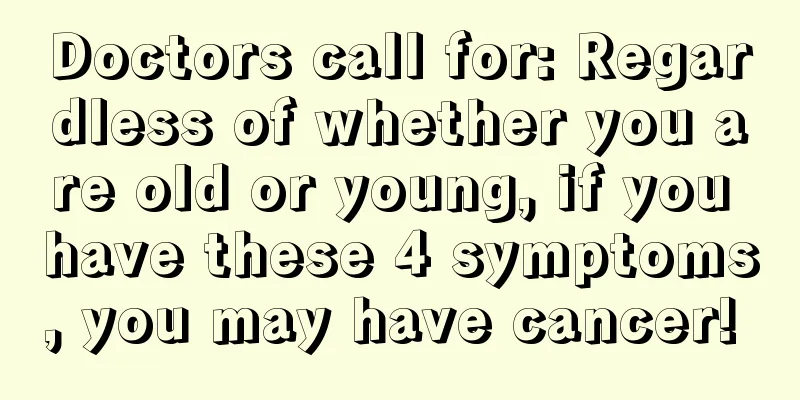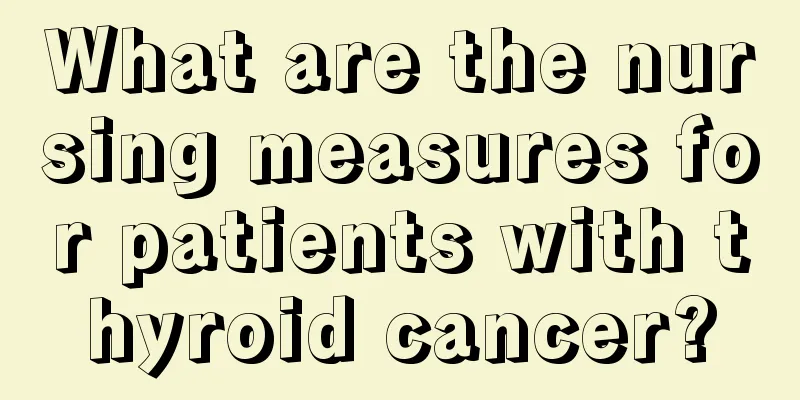Doctors call for: Regardless of whether you are old or young, if you have these 4 symptoms, you may have cancer!

|
Aunt Zhang, 60 years old, has been feeling something is wrong lately. Her clothes are getting looser and her weight is dropping inexplicably, just like the stock market. She wondered if she would naturally lose weight at this age, but she didn't expect that she would lose weight faster than a fitness coach. Her family felt sorry for her and advised her to go to the hospital. After a checkup, it turned out to be cancer! Aunt Zhang's situation is not an isolated case. In fact, many times, we inadvertently ignore the signals that cancer sends us! Doctors call for attention: If you have these 4 symptoms, you may have cancer! Rapid weight loss: Rapid weight loss without dieting or exercising may be a sign of cancer. One of the characteristics of cancer is that it is a wasting disease that overdraws the nutrients a patient consumes and stores, causing the body to rapidly lose weight. Unexplained bleeding: Any solid or non-malignant tumor that appears on an organ may be accompanied by bleeding symptoms when it develops to the middle or late stages. For example, nasopharyngeal cancer may cause nosebleeds, and gastrointestinal cancer may be accompanied by gastrointestinal bleeding. Persistent pain: In the early stages of cancer, patients usually do not experience pain. However, as the cancer continues to develop, intermittent, dull, or stabbing pain may gradually appear in a certain area. When the cancer presses on surrounding tissue or the nervous system, pain may radiate to other areas. Fever: Intermittent or persistent fever is also a typical symptom of cancer in the middle and late stages. As the cancer continues to grow, parts of the tumor will gradually become necrotic due to lack of blood and oxygen. The necrotic tissue will then be reabsorbed by the body, inducing high fever. The arrival of the above four symptoms is usually a manifestation of continued cancer progression. However, these symptoms do not necessarily mean you have cancer, as many chronic illnesses can have symptoms similar to those of cancer. Therefore, physical discomfort can only be regarded as the body's distress signal. If you want to know exactly what the problem is, you must undergo a series of examinations to confirm the diagnosis. If you or a family member experiences the above symptoms, please see a doctor as soon as possible. Early detection and treatment of cancer are crucial to improving cure and survival rates. Regardless of your age, frequently doing the following things will increase your risk of cancer. Can you test yourself to see if you have any of these things? Doctors call for: Avoid these behaviors to reduce the risk of cancer! Eating overheated food: Food that is too hot can burn the esophageal mucosa, and doing so for a long time will increase the risk of esophageal cancer. It is recommended to wait until the food temperature drops below 60℃ before eating. Obesity: Obesity increases the risk of cancer, especially pancreatic cancer, liver cancer and kidney cancer. Maintain a healthy weight through a healthy diet and adequate exercise. Staying up late: Staying up late for a long time will disrupt the biological clock and increase the risk of cancer, such as liver cancer, lung cancer and esophageal cancer. It is recommended to maintain a regular schedule and avoid staying up late. Eating too salty food: The nitrite in high-salt food is converted into carcinogens in the stomach, increasing the risk of stomach cancer. It is recommended that daily salt intake should not exceed 6 grams. Smoking: Smoking is a major cause of many cancers, especially lung, laryngeal and esophageal cancers. Quit smoking as soon as possible. Overeating: Always eating too much will reduce the activity of cells and increase the risk of cancer. It is recommended to eat only 70% to 80% full at each meal. Angry: Being in a negative mood for a long time will reduce immunity and resistance, and increase the risk of cancer. It is recommended to maintain a positive and optimistic attitude. Sedentary: Sitting for long periods of time can affect blood circulation and increase the risk of cancer, especially colorectal cancer and prostate cancer. It is recommended to get up and move around for 10 minutes every 40 minutes of sitting, and do moderate aerobic exercise. Drinking sugary drinks: Regular consumption of sugary drinks increases the risk of endometrial cancer and may lead to obesity, which increases the risk of colorectal and breast cancer. It is recommended to drink more boiled water. Eating smoked or grilled foods: The high temperatures in smoked or grilled foods may change the DNA structure and produce carcinogens. It is recommended to reduce the intake of smoked and grilled foods. For your health, please consider carefully and take appropriate precautions. Some foods are not suitable for consumption by both the elderly and children. Doctor's advice: For the sake of good health, these foods should be avoided! Here are some types of foods that doctors recommend avoiding: Spicy food: Spicy food may irritate the gastrointestinal tract and may cause discomfort to the elderly and children with weak digestive systems. Fried foods: Fried foods are usually high in fat and calories and are difficult to digest. Long-term consumption may increase the risk of cardiovascular disease. High-sugar foods: Excessive sugar intake increases the risk of obesity and diabetes, and is particularly detrimental to the healthy growth of children. Cold foods: such as ice cream, cold drinks, etc. These foods may cause gastrointestinal disorders, especially when the weather is cold or the body is weak. In addition, for the elderly, special attention should be paid to the following foods: Peanuts: Although peanuts are rich in nutrients, they are high in protein and fat, which may increase the burden on the kidneys and heart. Fried dough sticks: Fried dough sticks contain aluminum inorganic substances. Excessive consumption may cause the body to be unable to excrete normally. For children, their digestive systems are not fully mature yet, so they need to avoid eating foods that are too greasy, spicy or difficult to digest. At the same time, parents should limit their children's intake of high-sugar, high-salt and high-fat snacks to promote healthy growth. In general, people of different age groups have specific food taboos, and a reasonable diet is the key to maintaining health. When choosing food, you should consider your personal health status and physiological needs, and consult a professional doctor if necessary. So, dear friends, whether you are young and strong or old and weak, once you find yourself with these abnormalities, don't try to hold on, don't comfort yourself by saying it's a minor problem. Go to the hospital in time to find out these strange phenomena, early detection and early treatment, don't let minor illnesses turn into major illnesses. Remember, a healthy body is the greatest wealth, isn't it? Don't wait until you lose it to regret it, go get it checked quickly! |
Recommend
What are the basic elements of care for melanoma patients
In recent years, melanoma has gradually evolved i...
Muscle training diet method
For men, it is necessary to have muscles. Men wit...
Symptoms of recurrence of endometrial cancer
Endometrial cancer is a malignant tumor that grow...
How to prevent muscle growth after running
Running has certain benefits to the human body, s...
Taking tuberculosis medicine causes joint pain
Patients with pulmonary tuberculosis need to take...
A few years of chemotherapy for prostate cancer 10 courses of treatment
How many years does it take to complete 10 course...
How to make a homemade spa mask
When we finish a busy day, not only does our body...
The reason why there are small lumps of flesh on the neck is so scary
Friends, have you noticed that you have grown a l...
My arm got red and swollen after the vaccination
Children have very poor resistance, therefore, in...
What are the complications of pancreatic cancer
Don't give pancreatic cancer complications an...
Could back pain be lung cancer?
More common causes of back pain include chest inj...
I don't feel hungry all day long
Three meals a day should be properly arranged, an...
Nutritional information of black wolfberry
Among health care foods, wolfberry is one of our ...
What ointment should I use for black corners of mouth
Many people will find in life that boys will grow...
What tests are needed for liver cancer? 4 methods of checking liver cancer
Liver cancer is a type of cancer that occurs in t...









